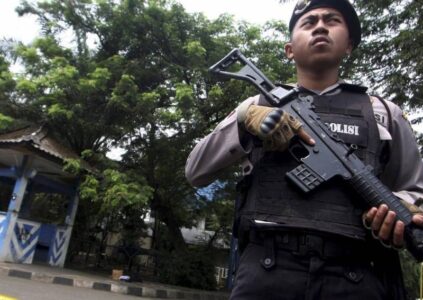
Islamic State support in Indonesia drops but terrorists are splintering to produce small terror cells
Pro-Islamic State (Isis) activity and support for it in Indonesia declined last year, but authorities should not rest easy as militant groups are splintering to produce small “pop up” terror cells that aim to conduct jihad operations, a Jakarta-based think-tank has warned.
In its latest report released on Tuesday, the Institute of Policy Analysis of Conflict (IPAC) outlined the factors that led to a fall in pro-Isis activity, including better law enforcement, the collapse of Isis, and “self awareness of individuals that the costs of Isis support outweighed the benefits”.
It added that the largest pro-Isis coalition in Indonesia, Jemaah Anshorut Daulah (JAD), the group behind the country’s major terror attacks since 2016, had been largely dormant since late last year.
The Covid-19 pandemic may also have played a role in discouraging travel and mass gatherings and weakening the extremist funding base, it said, adding that Indonesian counterterrorism police arrested 232 terror suspects from several groups last year, versus 320 in 2019.
With Indonesia mired in its first recession of 22 years last year, there were concerns that an economic downturn would fuel a rise in terrorism. But IPAC said there was little evidence of such a correlation in the past.
“Nevertheless, at least two of the groups arrested in 2020 discussed plots against mainland Chinese interests in Indonesia. They never got close to becoming operational,” said IPAC.
While the overall picture was of “a manageable threat with nothing to undermine political stability and nothing beyond police capacity to manage”, regeneration within militant networks remained a concern, it said.
Indonesia’s terrorists have always had a high degree of mobility and members of cells broken up through arrests or loss of leadership can easily find new allies – whether online, through contacts among prisoners’ families or though a trading network, said IPAC.
“But precisely because many of these cells are so rudimentary, they can pop up anywhere,” said IPAC.
Most of the larger pro-Isis groups had an institutional base, either a school or a mosque and sometimes a network of schools, to serve as a centre for outreach and recruitment.
The most notorious was Pesantren Ibn Mas’oed (Islamic boarding school) in Bogor, associated with the pro-Isis JAD leader Aman Abdurrahman, that served as a recruitment centre for Syria between 2014 and 2017. The government closed it down in 2017.
By 2020, extremists were more focused on setting up schools to memorise the Koran to draw in new recruits.
The report cited the al Qaeda-linked Jemaah Islamiah (JI), the group behind the devastating 2002 Bali bombings which killed 202, including 11 Hong Kong residents, as an example of potential splintering.
JI was responsible for all the major terror attacks in Indonesia from 1999-2010 before it was weakened by the arrests of its leaders and members, the most recent being leader Para Wijayanto in 2019. It has dozens of Syrian-trained cadres.
But the danger from JI was not that of an imminent attack, IPAC said. “It has been rather the emergence of a militant splinter impatient at the leadership’s avoidance of violence in its pursuit of a long- term strategy of building up an economic and political base,” the report said.
JI’s spiritual leader Abu Bakar Bashir was released several weeks ago from an Indonesian jail on good behaviour, having completed just over two-thirds of his 15-year sentence, and “the danger was not that the 82-year-old cleric would somehow ignite a new wave of terrorism, as many in the international media seemed to fear”, said IPAC.
“It was rather that he would use his prestige as elder statesman of the radical movement to unify the often-feuding pro-Shari’a groups in Solo (Central Java) in support of exclusivist Islamist regulations and policies.”
IPAC said the challenge for the Indonesian government – which has an action plan on countering violent extremism signed by President Joko Widodo on January 6 – was not just to arrest militants or would-be perpetrators of attacks but to prevent recruitment and regeneration.
To do this, they could map out where known extremists, convicted terrorists and ex-prisoners send their own children to school and preschool, and ensure that the teachers, including women teachers, and teaching materials have been thoroughly vetted.
“All extremist groups like to start indoctrination young,” said IPAC.
It also pointed to how local initiatives had succeeded in replacing pro-Isis leaders of extremist schools and mosques with neutral or anti-Isis clerics, but warned that it would take constant monitoring and “sometimes significant outlay of funds to prevent backsliding”, as radical teachers could simply move on to another institution close by.
Authorities also needed to keep an eye on those who had renounced violent extremism, as social pressure from old networks to return could be intense, with women just as likely as men to urge continued commitment to the cause.
Police should also do everything possible to avoid deaths of suspects during counterterrorism operations.
“Vengeance is a far more powerful motive for undertaking terrorist attacks than any other and explains why police are still so often the target of attacks,” said IPAC.
In the report, IPAC highlighted how three dimensions are often employed in assessing the risk from terrorist groups: capacity, opportunity and intention. On the first two counts, the picture in Indonesia “is reasonably good” as capacity remains low.
“There has been no significant enhancement of tactics, weaponry and or operational planning capability. No one has returned from Syria with a demonstrable new skill set that has been imparted to local groups,” said IPAC, adding that Indonesian extremists had not yet moved into the realm of hi-tech cyber warfare.
“The biggest danger is still from home-made bombs, drive-by shootings and machete attacks,” said IPAC.
Source: Asia One





